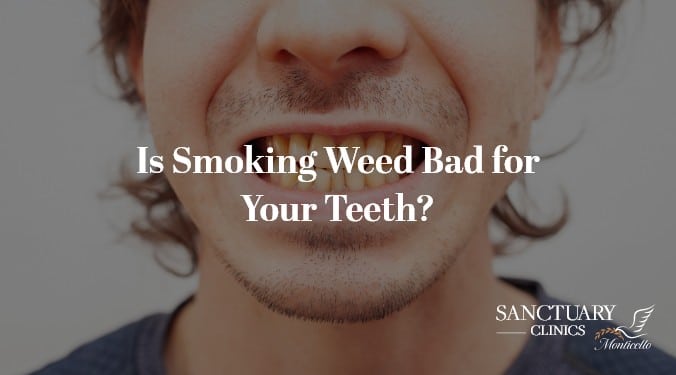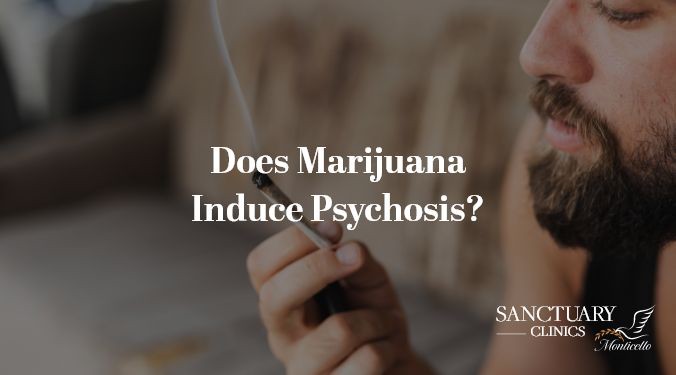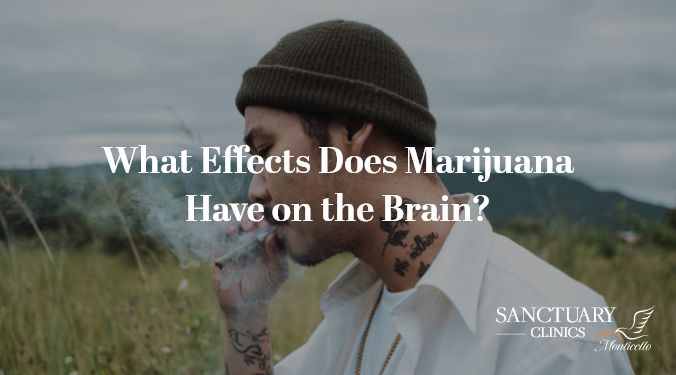With the legalization of marijuana for recreational purposes and medical use in many places, weed use is on the rise. It is only a matter of time before studies will be conducted about the harmful effects weed has on different parts of our bodies. For years, dental professionals have been studying the negative effects weed use can have on your mouth. The harmful effects to your oral health from weed use and tobacco use aren’t very different.
Yes, smoking weed is bad for your health. Weed use has been found to cause multiple negative side effects regarding your oral health. These risk factors can include oral health problems such as xerostomia (dry mouth), stained teeth, higher mouth and neck cancer risk, unhealthy food cravings, tooth decay, gum irritation, increased oral bacteria, bad breath, periodontal disease/periodontitis (gum infection), oral lesions (ulcers), leukoplakia (white patches inside your mouth), gingival enlargement/hyperplasia (enlarged gums), candidiasis (fungal infection), alveolar bone loss (loss of bone mass around the teeth), stomatitis (inflamed mouth), and interference with calcium absorption.
How the inside of your mouth works
The inside of your mouth has many connected components. All these components need to be in balance, so your mouth functions like an ecosystem. Saliva is a very important component in good oral health. It makes the mouth moist and works to break down food. It also clears and breaks down bacteria from the gums and teeth. This keeps you from getting cavities and helps you keep a healthy mouth.
Dry mouth and the need for saliva
Xerostomia (dry mouth or cotton mouth) happens often to marijuana smokers. The THC (tetrahydrocannabinol) in marijuana decreases saliva production and flow. It sends signals to the endocannabinoid receptors to start limiting the production of saliva. It also attaches to the salivary glands and limits their ability to produce norepinephrine (which breaks fat down and increases blood sugar levels) and methacholine (which induces salivary secretion). This puts cannabis smokers at higher risk for dental problems such as gum disease and tooth decay.
Saliva plays an important role in balancing the PH (potential of hydrogen) in your mouth, rinsing away bacteria and food particles, and preventing higher levels of plaque buildup. Without it, the pieces of food and bacteria stay where they are, causing irritation. Not enough saliva can also give you bad breath, tooth loss, tongue inflammation, oral fungal infections, gingival enlargement/hyperplasia, and sores on your gums, tongue, and the roof of your mouth. If left for too long, it’s negative impact can lead to cavities, more extreme infections in the framework around your teeth, and generally poor oral hygiene. This can lead to a higher chance of alveolar bone and tooth loss. You also need a certain level of saliva to speak and chew properly.
Sometimes, the saliva in the mouth of a weed user can become sticky. This causes plaque to stick to your teeth. The more plaque on your teeth, the more danger of it hardening into tartar.
What about “the munchies”?
Another side-effect of cannabis use is food cravings. The cells in the brain which shut off hunger become stimulated, and lead to you feeling gluttonous. The cravings can happen even if you just ate, and you most likely will eat a larger amount than normal. Cannabis also imitates the effects of carbs in your stomach, leading cannabis users to want more.
After consuming cannabis, many people have extreme cravings for foods that are high in carbs, starch, or sugar. These foods are detrimental to your oral health. They feed the bacteria which causes tooth decay. They are also sticky, so pieces get stuck around your mouth and adhere to your teeth. This can quickly lead to marijuana mouth, stomatitis, and cause cavities and periodontal disease.
The effects on weed on your teeth
Smoking marijuana on a daily basis can stain your teeth. The cannabis plant contains tannins (chemical substances) which stain teeth. The carcinogens (substances which can cause cancer) in marijuana also leave stains when they are inhaled. Stains can still happen from frequent use even if you are brushing, flossing, and going to the dentist regularly. You can use a tooth whitener, but it will eventually cause tooth sensitivity and enamel erosion. And, of course, if you continue to use marijuana, the stains will come back.
Bacteria which causes cavities is more prevalent in the mouth of a marijuana user. Some studies even suggest cannabis may curb the immune system in your mouth. This increases your risk of dental caries.
THC (tetrahydrocannabinol) has been found to interfere with the absorption of calcium. Your teeth need calcium to stay strong.
For people who have been smoking weed for a long time, irritated gums have been seen to start to separate from the teeth. This creates pockets where bacteria can grow, and food can get caught. If not treated, this can result in tooth decay, bad breath, gum disease, high levels of plaque buildup, and overall compromised dental health.
The effects of weed on your gums
Your gums cannot take the high temperatures from pipes, bongs, or joints. Mild burning can occur. You may not notice the burns, but the tissue has still been damaged, and your risk of gum disease has increased. The irritants (substances which cause inflammation or other discomfort) in smoke can also damage your gums.
This can lead to bleeding, swelling, sensitivity, tooth loss, oral infections, candidiasis, gingivitis, lesions, gum inflammation, tooth and bone loss, and a decrease in gum tissue if it isn’t treated. Heat damaged tissue in your mouth can also absorb the toxic chemicals from smoke instead of protecting your mouth from it. These chemicals can stay in your mouth for hours or days, and can lead to periodontal disease, decay, pain, and swelling.
Any kind of infection you have in your mouth has the potential to spread to other parts of your body because marijuana limits the production of antibodies which help you fight infections.
Like tobacco smokers, weed smokers have been seen to experience gum irritation, periodontal disease (gum disease), oral mucosa (painful mouth sores or ulcers in the lining of the mouth), and gingivitis (inflammation of the gums). It has also been linked to Leukoplakia, which is white patches inside the mouth. The longer you have smoked weed, the more at risk you are of developing these conditions.
Other risks associated with weed use
According to the American Dental Association, cannabis smoking “is associated with periodontal complications, xerostomia, and leukoplakia as well as increased risk of mouth and neck cancers.”
There has been current research linking smoking cannabis to the adverse effects of developing oral and neck cancer. Although less than tobacco, studies have shown that the risk of oral cancer is raised by smoking cannabis. The risk is higher for marijuana users who are under 50 years old.
Regular weed use has been seen to affect your brain health. When weed use is started at a young age, a permanent loss of as much as eight IQ points can occur. These points do not come back even after the weed use has ceased. Weed use has also been linked to anxiety, depression, suicidal ideation, and psychotic episodes. It can affect your performance in your daily life, driving, athletics, and if you are pregnant, it can affect your unborn child’s growth and brain development.
How can I quit weed?
Your first step is to recognize you have a problem. Then you should make a detailed plan about how you will tackle your recovery and remain clean.
There are many options to help with your recovery. Individual counseling is great for preparing you for what you will experience and what withdrawals you may have. Group counseling or support groups are also very helpful so you can be reassured there are people going through the same thing you are. Family counseling encourages your family to work on the issue together. Meditation can help you relax and clear your mind.
Cognitive Behavioral Therapy (CBT) helps you think differently about your situation and gives you strategies to handle your emotions and habits. Contingency Management (CM) trains your brain to behave differently and produce positive thoughts instead of negative thoughts. Motivational Enhancement Therapy (MET) helps you set your goals. 12-Step Programs have you work steps toward recovery. Your doctor also may choose to give you an anti-depressant, which can combat the side-effects of withdrawal.
Lastly, in-patient treatment provides a very structured environment to keep you from negative thoughts and provides counseling on life management.









